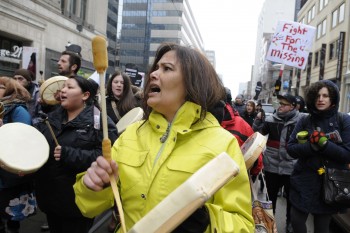How paediatricians can support Indigenous girls and women
Posted on November 15, 2019 by the Canadian Paediatric Society | Permalink
Topic(s):
By Kaleigh Hlady, MD, University of Saskatchewan, Saskatoon
“For our young women, for our grandmothers, for our women who travel with us, we are sacred because we exist. We are sacred because we have survived.” – Audrey Siegl, knowledge-keeper, healer, and member of the Elders and Grandmothers Circle.
The National Inquiry on Missing and Murdered Indigenous Women and Girls, which released its final report in June 2019, was mandated to “report on the systemic causes of all forms of violence against Indigenous Women and girls… [and] examine the underlying social, economic, cultural, institutional, and historical causes that contribute to the ongoing violence and particular vulnerabilities of Indigenous women and girls in Canada”.
The inquiry showed how widespread assumptions in Canadian society maintain colonial violence and cause harm to Indigenous families. We know that factors such as economic and social marginalization affect health, but rarely do we discuss historical, multigenerational and intergenerational trauma, or institutional lack of will.
Here are some ways that Canadian paediatricians can respond to the Inquiry, both individually and through the Canadian Paediatric Society (CPS).
Review and advocate for the Calls for Justice
The Calls for Justice are based on domestic and international human and Indigenous rights law, so there are both legal and ethical imperatives to act on them. Advancing the calls will require focused activism and interdisciplinary cooperation, so read the Calls to Action. As a health professional, you may want to pay particular attention to the sections on health.
Learn about “gendered oppression”
Indigenous scholar Lee Maracle writes: “Indigenous peoples brought into being and practiced a social organization that viewed gender in the same continuum, with the same sense of circularity and integral interrelations which we attached to everything in life” (see final report, page 240). Early colonial and Christian infrastructure helped dehumanize and displace Indigenous women, girls, and 2SLGBTQQIA people. Recognizing and celebrating all genders and sexualities, as current pediatric literature advocates, helps to dismantle these harmful imposed ideologies. The Inquiry outlines multiple examples of gendered violence that was specifically facilitated by early Canadian governments. Sexist and dehumanizing policies were sanctioned in legislation such as The Indian Act, and a hypersexualized stereotype of Indigenous women was propagated by government to justify sexual violence. Understanding the ways that specific gendered violence has been facilitated historically helps health care workers to understand the experience of our patients as well as to examine biases we may have internalized that could cause ongoing harm.
Enhance interjurisdictional cooperation
The knowledge of Indigenous women and girls has guided interventions that decrease violence and promote healing in communities across Canada. However, the infrastructure of government and of key systems such as health care, justice, and child welfare can work against the practical implementation of this knowledge. Dr. Valerie Gideon said that “the greatest barriers rest in how provincial and territorial health systems organize their services” (see final report, page 418). There are many opportunities for interjurisdictional cooperation involving paediatric services. The report emphasizes examples of pediatric services in Canada that have cooperated with child welfare services and mental health services, and with police regarding child sexual exploitation and human trafficking. Pediatricians should recognize where structural or political barriers to wellness exist in their communities and be creative and collaborative in dismantling them.
Prioritize relationships in patient encounters
Each interaction between a vulnerable person and a system or authority intended to help is an opportunity to prevent or mitigate harm, but these encounters can inadvertently cause harm. Pediatricians are aware of the importance of connecting with patients. Family knowledge shared in the report regarding the centrality of relationships in Indigenous culture and regarding the link between provider relationships and patient safety calls on us to intensify our focus on and our prioritization of relationship building.
Help decolonize health care
The inquiry describes how colonial ideology embedded in Canadian institutions, including health care, is the root of violence against Indigenous women and girls. To help decolonize health care, practitioners need to educate themselves about the history of Indigenous genocide in Canada, about how to identify colonial beliefs in the health care system. Decolonization means respecting and making space for Indigenous voices and different ways of knowing.
As health professionals, we are all part of this complex journey towards decolonization. I am hopeful that the focus on family and community that is integral to the practice of paediatrics might enable us to advocate for and facilitate this discussion.
Thanks to the members of the CPS First Nations, Inuit and Métis Health Committee for their thoughtful reviews and comments, especially Dr. Véronique Pelletier, Dr. Brett Schrewe, and Dr. Radha Jetty.
Copyright
The Canadian Paediatric Society holds copyright on all information we publish on this blog. For complete details, read our Copyright Policy.
Disclaimer
The information on this blog should not be used as a substitute for medical care and advice. The views of blog writers do not necessarily represent the views of the Canadian Paediatric Society.
Last updated: May 5, 2020

